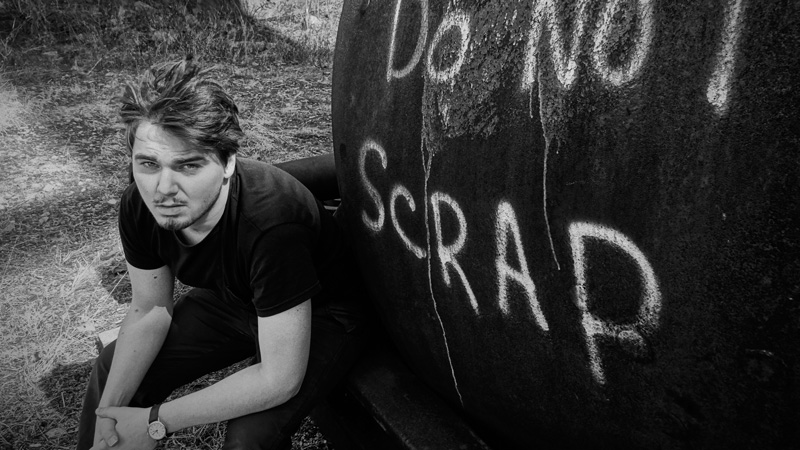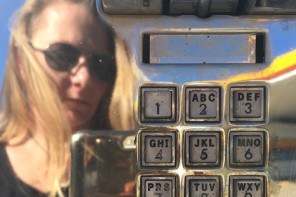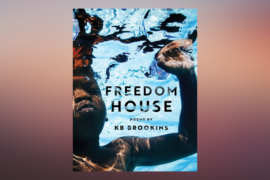Words with Pittsburgh-based fiction writer.
Eric Boyd is a fiction writer in Pittsburgh, Pennsylvania. He won the 2012 PEN Prison Writing award and was nominated for the Pushcart Prize. His work has appeared in The Missouri Review, Midwestern Gothic, Burro Press Review. His story, “Wayward” was published in the issue 2 of Bridge Eight Literary Magazine.
On Saturday, October 17th, 2016, he’ll be coming to Jacksonville to be featured in our Abridged Reading Series at The Barnett alongside J. Bradley and Tiffany Melanson.
Caleb: Looking at stories like “Little by Little” (Luna Luna Mag) and “Pictures” (Burrow Press Review), we get the sense that the truth presented isn’t absolute. How much does the truth matter in your fiction?
EB: I kind of feel like what’s true and what’s honest can be very different things. A lot of my work deals with what isn’t being said, what’s being held back even if everyone already knows. I mean, we’re all going to die, y’know? But nobody talks about it the way they do in life insurance commercials; that’s probably the biggest thing I see in writing I don’t like, that I feel like I’m being sold something.
People don’t talk about a lot of things. I know Atwood just said now isn’t the time for realistic fiction—and that’s what I think I mostly deal in—but there’s a sort of inherit fantasy to real life. People pretend things away, they ignore them. You ask someone to tell you about themselves and they talk about their job or their mortgage. And is that them? It’s very hard to break those things down even if it’s plain as day what they’re hiding.
there’s a sort of inherit fantasy to real life. People pretend things away, they ignore them.
CS: In “The Chains That Keep” (PEN / Guernica Flash Series), a jitney driver tells about an experience with a passenger. The details are there, but a lot of the effect is left to the reader. How often do you find yourself trusting the reader in your work?
I’ll admit there have been times where, because a story is so well-known in my head, too many details get left out because I’m afraid of being too obvious. It’s not that I’m trying to be secretive or clever, I just think readers are smart.
I read some chart or something about how, I don’t know, I’ll say fifty percent of people—even though I think it was actually more—so many people don’t read another book after high school… And those people work and pay their bills just like anyone else, so they’re not dumb. If people who will never read anything again can get through life alright, then the ones who do read are geniuses in my opinion. They don’t need things spelled out. However, I’ll admit that a lot of those more shadowy stories are on the shorter side; right now I’m working on pieces that clock in around eight or ten thousand works each. Even the piece in Bridge Eight is a bit longer, but the characters still aren’t airing everything out. At one point the main character flat-out tells another character something very important, and the other character just says something like, “Yeah I figured as much.” So even in those pieces it’s more important when the characters magnify things around them instead of magnifying themselves.
I don’t use a ton of internal monologue because I think you can depict those things in other ways. Like if I haven’t talked to a friend in a while, I go to their place and see it’s a wreck, their eyes are bloodshot and their clothes are very loose or something, well… They’re probably not doing so good. I don’t have to ask that or be told that. I hope my stories don’t have to tell anyone anything.
CS: You’re from Pittsburgh, and the city often shows up in your work. Is this a conscious decision or is it an inevitable part of the process? I myself can’t seem to ignore Jacksonville when I write.
Well right now I’m working on a collection that’s set entirely in the town of Homestead, which is just outside of Pittsburgh, so it’s mostly that I’m trying to stay focused on those stories and send those out more than anything else. For the last year or so I’ve really committed to working on nothing else unless it’s very special. I just guest-edited for The James Franco Review and, a few months later, they told me they were having an “emergency issue” concerning inclusiveness in the writing world, and that they wanted me to write a short essay about that. I think that’s a huge issue and has been for a long time, so I was happy to put my work aside and do that.
Things like that I’ll do, if I’m asked or solicited, whatever— otherwise I’m just trying to get this book done. But yeah, place is important. I’ve been on panels about how important regionalism is.
My example is always to imagine a noirish crime story set in someplace like North Dakota versus someplace like New Jersey. It could be the exact same story: robbery, murder, dump the evidence, hideout, etc… They’d be totally different.
Place can change so much, and right now the place I’m writing about is Homestead.
CS: You mentioned before that you’re working on a collection of short stories, tentatively titled Brownfields. Anything you can share with us about it?
Brownfields is the book I’m trying to finish up. It’s a good mix of short pieces and longer ones, all set in this town outside Pittsburgh where the world’s largest steel mill once operated.
You see a lot of people talk about places like New York, and how much better or worse they used to be, and that’s what my collection is about with this town of Homestead. Everyone used to work at the mills and it was a boom time, but that was backbreaking work. Fathers used to work so much just so their sons would never have to go in the mills— but by the Eighties everything closed and the town just rotted away.
Late Nineties, private investors came in and tore down what was left of the factories, made this huge outdoor mall called the Waterfront. That’s what a “brownfield” is, a way of taking ‘urban decay’ and ‘renewing’ it.
The whole thing was supposed to help Homestead—and they gave these huge tax breaks to the corporations that built stores at the Waterfront so they’d come in—but then of course it just sort of gentrified everything. There is a train track that runs between Homestead and the Waterfront and it’s a very real barrier, a border in every sense. Then all the tax breaks ran out over the past couple of years and a lot of those stores left.
There is a train track that runs between Homestead and the Waterfront and it’s a very real barrier, a border in every sense.
One of the biggest spaces has been empty for maybe four or five years? Every Fall it gets rented out as a Halloween store from August to early November, but most of the spaces go unused.
The book, at its core, is just about these different people, the lives they live, but in the background the question is how can you search for any meaning of substance when there’s none around.
CS:You run a pretty popular Tumblr page in which you feature “six worders.” How did the page come about and why the six-word limitation?
EB: I’ve had my Tumblr page for a few years, and was even writing six worders well before that; I had a PC full of them, hundreds of them, that crashed a long time ago.
For me they’re exercise. Conciseness is a really important thing to me, especially when my characters don’t open up too much. How much fat do you trim off a piece of meat before it doesn’t taste like anything? So the six worders are how I sharpen my knives, I guess. Supposedly Hemingway came up with it, though there’s some doubt about that, and while I’ve never come close to what he did with his piece, I enjoy the form. People call it a ‘limitation’ but it feels like they miss the point. We have no idea how this thing goes after we die, so we try to fit as much into the time we have, don’t we? I mean, what in the world isn’t limited? It reminds me of this thing a producer told George Romero when he was making “Dawn of the Dead”; the producer only had so much money for the budget, but whatever he had, Romero could use freely. He said something like, “There is a box, but once you’re inside the box, you can do whatever you want…” That’s what all of my writing is, a way to explore people’s confines. And as far as the six worders go, I think people want that.
For the last couple of years I’ve gotten countless people who have requested six worders from me about their own personal issues.
I’ll get paragraphs and paragraphs of these lives that people just want to make sense of, I think? They want things boiled down, made simple somehow. And it seems to work! A lot of the time these requests are anonymous, I do the six worder, and I never hear anything again… But some people write back and say how much it meant; a few folks have gotten tattoos of their six words or written in a bathroom stall, whatever. It’s amazing. Then of course you get people who go, “Hey can you write six words about how much of a fucking idiot you are lol?” And I do those as well.
CS: Writing, as an art form, is very much alive. Why do you write? Especially fiction. Why bother writing at all?
EB: I like that phrase, ‘the art form is alive’, and I think that’s all I want from my work, to be alive in the way people are. People struggle, they do things that don’t make sense; they talk about it or they don’t. I said already I just don’t want my work to read like a life insurance ad, I want the characters to breathe, trip up on their words, make mistakes. There’s this very fundamental paradox, for me, to the idea of a short story, which is that I’m not so interested in a story. I want to read a short life. I want to be dropped in and plucked right back out. That’s how I see things.
I just don’t want my work to read like a life insurance ad, I want the characters to breathe, trip up on their words, make mistakes.
There are so many people you’ll meet that will leave your life, and that’s all there is to it. So in that regard, stories feel forced a lot of the time. If I can see the writer at work, it ruins it for me. So often you can picture the writer saying, “What if this happened here and this was the outcome?” Of course you have to imagine some kind of plot—and I’m not saying that all writing should just be this aimless, meandering nothings; I’d like to think I write things that mean something—but at the same time you start to feel like the characters are being cheated.
I’d like to think I write things that mean something
I have this one piece, it’s the first story I wrote that really made me think about this Brownfields book, and I’ve been tweaking it for years. It’s less than two thousand words, and initially it started as a very “Gotcha!” thing: there was a setup, some characters to play it out, and a punch at the end. After a while of sitting on the thing I re-read it and actually cried! I seriously cried about the situation the characters were in and I hated myself for not being more empathic to them. So now I’m really trying to look at my work and my life from a human level. There are things we can’t take back and, in life, that can change everything. You can turn your whole world to shit and not even mean to, so in writing we should have the same amount of concern.
Writers like to think they’re playing God and they leave it at that, but I bet you God feels like shit every single day.
CS: This Saturday you’ll be in Jacksonville hanging out with us and reading at The Barnett. Is there anything you’re looking forward to while you’re here?
EB: I’ve never been down to Florida, so it’s going to be a real thrill. I’m going to look up what’s around and hopefully me and my girlfriend can explore a little bit. It should be nice to escape Pittsburgh’s forty degree weather for a bit. Also, the reading is one day after my birthday!
Last year I got to do a reading with Joyce Carol Oates on my birthday, so I’m going to see if I can’t make that a thing from now on, be a part of some great event. If you wanted to get really heady about it, you could say it makes total sense for someone who writes to share their work on their birthday. There’s probably some metaphor in there. Who knows? Also I like free drinks and strangers singing to me.




